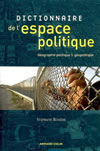Introducing Stéphane Rosière
 Stéphane Rosière holds a PhD in Geography and is currently Professor at Université de Reims Champagne-Ardenne (France). Moreover, he is member of the Steering Committee of the Commission on Political Geography of the IGU/UGI and editor-in-chief of the online journal L’Espace Politique
Stéphane Rosière holds a PhD in Geography and is currently Professor at Université de Reims Champagne-Ardenne (France). Moreover, he is member of the Steering Committee of the Commission on Political Geography of the IGU/UGI and editor-in-chief of the online journal L’Espace Politique
Geopolitical Passport
Your relationship with geopolitics
 At what age did you discover geopolitics and what attracted you to it?
At what age did you discover geopolitics and what attracted you to it?
I discovered geopolitics when I was student (bachelor degree) in the geography departement of the University of Nantes. One of my teachers taught me Epistemology of geography and discussed various branches of the discipline. Among these branches was Geopolitics. I knew right away that this was my topic.
As a matter of fact, as a child, I always drew imaginary maps full of borders and geopolitical tensions… and only this really interested me. Nonetheless, before the lectures on geopolitics, I had not known that this discipline existed. The lectures were some sort of epiphany: I found my future career in the time I need to “snap my fingers” (as we say in French).
Second fact, the geopolitics was nearly not taught at this time in France (the beginning of the 1980’s). Only Yves Lacoste did it in Paris. The luck was that one of my teacher (Nicole Sztokman) wrote me a recommendation letter for this famous Professor and he acccepted me in his Master degree class during the next year. So the adventure started.
Which geopolitical topics have your focus and why did you choose especially these?
I have always worked on the topics of social and political violence, and justice. However, I have never used the expression “spatial justice” in my work.
The subject of my PhD thesis was “Hungarian minorities in Central Europe”. I described the boundaries ‘game’ in this region using a classical approach of Geopolitics. Furthermore, the PhD addressed the related oppression of the peoples in nationalist states since the signature of the Trianon treaty (1920). The historical dimension was rather importantin this work. In fact, is it possible to deal with geopolitics forgetting time and social dynamics?
Later, during my specific research to get my “Habilitation à diriger les recherches” (accreditation to supervise research — in the French academic system this certicate aims to become full professor) I chose the topic “ethnic cleansing”, a more evident kind of political violence. It was quite hard to get the stomach to work on this field but I discovered with interest the spatial logics of this politics.
Today, I am interested in “walls” and situations where boundaries function as barriers. “Walls” (or fences) are obvious forms of coercion against poor migrants and concrete proof that the idea of ‘free movement’ of people is a simplification if not a lie concerning the modalities of globalization.
What do you consider your most important contribution to geopolitics?
Three points may be underlined:
- I wrote the first French handbook of Political Geography and Geopolitics (“Géographie politique et géopolitique. Une grammaire de l’espace politique”). As the French tradition avoided to deal with that field during a long period, there was no handbook in this matter. It is strange for instance that even Yves Lacoste never wrote such a book. When I was associate professor in the University of Nancy, my colleagues entrusted me to give a lesson of geopolitics to my bachelor students. As there was no book, I wrote it. So my course slowly became the book.
- I wrote the only generalist book in French about ethnic cleansing (“Le nettoyage ethnique. Terreur et peuplement”). There are at least half a dozen of such books in English, by historians such as Norman Naimark or political scientists such as Andrew Bell-Fialkoff and Michael Mann. It was hard to find a publisher as the book was repeatedly refused, but eventually I succeeded. I am proud of this really geopolitical analysis of mass violence.
- I wrote the first dictionary of political geography and geopolitics centered on concepts (“Dictionnaire de l’espace politique”). Other dictionaries of geopolitics (a very fashionable term in the French language!) are largely devoted to names of famous geopoliticians and states, hardly discussing theories (Yves Lacoste’s one for instance). On the contrary, I wrote a dictionnary which is completely focused on geographical concepts, geopolitical theories or general words related to political geography. It is a very original approach: such a book does not even exist in the English language.
I truly regret that none of these books have aroused an interest among Anglo-Saxon publishers as they have no equivalent in English. Of course there exist various (and good) handbooks of Geopolitics or Political Geography, so I understand that my own handbook remains untranslated. It is more difficult to understand why an original dictionary like the “Dictionnaire de l’espace politique ” would not interest the Anglo-Saxon public. I would say that as a French author, it is rather hard to enter this market, it feels like hitting a wall!
My geopolitical preferences
What is your favourite definition of geopolitics?
Geopolitics “deals with space as an objective” — “considère l’espace comme un enjeu” (Rosière, 2003). This large definition allows to deal with various problems at any scale. Many definitions of Geopolitics focus too much on the upper (international) scale. This approach makes it hard to differentiate between geopolitics and International Relations. This is especiallly true for the realist ‘school’ if, indeed, it deals with states politics. In fact, as a geographer, I can underline the ‘multiscalar’ dimension of geopolitics. Land use planning or regional delimitations are for instance important geopolitical matters which are often underestimated.
Which geopolitical scientist do you admire the most?
The (unknown) French geographer Alain Reynaud. He has developed a wise theory of ‘socio-spatial classes’ which has influenced geographers such as Jacques Lévy (one of the most famous French geographers).
In the same field I can mention David Harvey, but also Immanuel Wallerstein who is not a geographer but set up a very useful geopolitical theory of domination. To my mind Wallerstein is the more important contemporary geopolitician (but I am not sure I would appreciate the compliment!).
Finally, I can suggest Kevin Cox whose theoretical work is ambitious and so friendly. We co-edited a book together: “Penser l’espace politique” (S. Rosière, K. Cox, C. Vacchiani-Marcuzzo, C. Dahlman, eds., Paris, Ellipse, 2009). This book has neither been translated into English…
What is your favourite geopolitical book?
“The SAGE Handbook of Political Geography” (Cox, Low, Robinson, 2008) is very useful for the teacher I am because of its clarity and wide range of topics.
I can further recommend “Critical geopolitics” by Gearoid O’Tuathail as it underlines the key-role of discourses and representations -an often underestimates side of Geopolitics.
What is your favourite geopolitical website?
The website of the journal L’espace Politique because…I have founded it! When you have a son it is natural to be proud of him. I dedicate a lot of work on it, and its content is entirely free. This free access dimension seems to me very important in a world dominated by the free-market logics and the profitability of thinking. Knowledge is not merchandise!
The geopolitical future
In what direction(s) will geopolitical science be heading the coming decades?
Probably in the direction of economical matters. Economy is a key dimension of imperialism and so a key dimension of Geopolitics. This does not mean that the physical violence will vanish.
Economy “is a mere continuation of politics by other means” to paraphrase Clausewitz. Only casualties change: peasants, unskilled workers, temporary employees and all unnecessary human beings in neo-liberal logics… Today the concept of Third World is often considered as old-fashioned, I don’t agree. The Third World (as translation of “Tiers-État” in French: those who are not allowed to express) still exists and is growing up!
Which geopolitical subject has been too little in the spotlight and needs further research?
The growing number of poor people on earth, the impoverishment of the majority of the population, the lies of the so-called ‘liberal’ system, the endless fight against imperialism and domination logics. After all, we geopoliticians must not forget that we were the tools of imperialism (Haushofer, Spykman and so on).
We have a debt vis-à-vis mankind, in this perspective we have to deconstruct the domination discourses and spatial logics to allow emancipation and spatial justice.
What will be the largest geopolitical challenge for the world in the 21st century?
Mass poverty and the related crisis to come.
